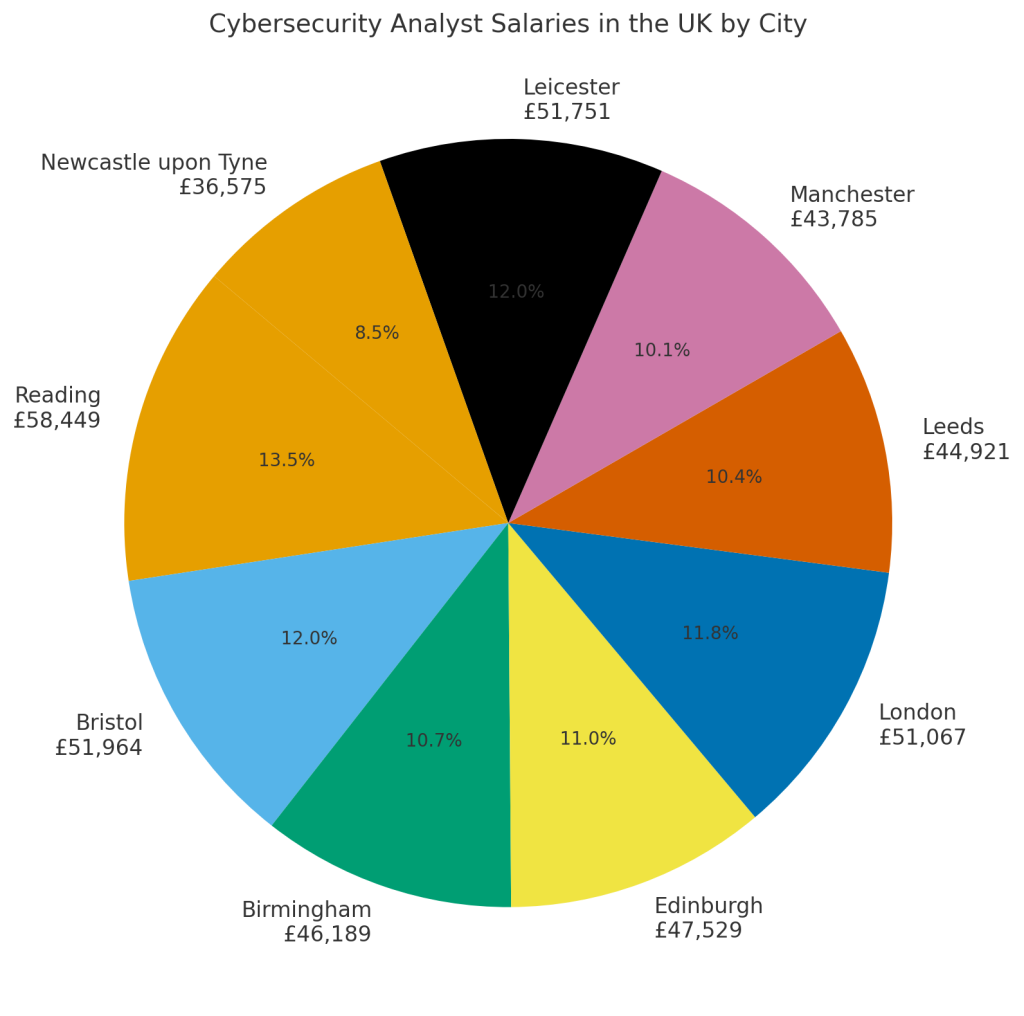Cybersecurity Analyst Salary in the UK: Roles, Levels, and Industries

A career in cybersecurity has become one of the most reliable options for those who want stability, growth, and an opportunity to work in an area that is essential for every organisation. With the increasing reliance on digital platforms, businesses and government departments require professionals who can identify risks, manage threats, and respond to cyberattacks.
Salaries in this field reflect the importance of the role, and they are often higher than in many other areas of technology.
In this article, we will explore the cybersecurity analyst salary in the UK across different levels, industries, and roles. The focus will be on average pay, ranging from entry-level to high-level salaries, the responsibilities of professionals in this role, and how salaries vary by specialisation.
This guide will also explain the factors that influence pay and how professionals can increase their earning potential through skills and experience.
What is the Average Cybersecurity Analyst Salary in the UK?
The average cybersecurity analyst salary in the UK is often the first figure that people look for when considering a career in this field. It provides a benchmark for expected pay and helps professionals compare opportunities across industries and regions.
Salaries vary depending on factors such as location, company size, and level of experience. For instance, larger cities with higher living costs often pay more, while smaller towns or public organisations may offer less but provide additional benefits such as stability.
The average base salary for a cybersecurity analyst is about £44,902 per year as of September 2025. This figure demonstrates the substantial value placed on digital protection roles, primarily as organisations increasingly rely on secure systems to operate effectively.
Here are the factors that influence how this average salary can differ:
- Location matters: Salaries in London and other metropolitan areas are often higher due to the cost of living and demand.
- Industry differences: Finance, defence, and technology sectors tend to offer above-average salaries compared to healthcare or public services.
- Company size: Larger organisations usually allocate bigger budgets for cybersecurity, which raises the average salary range.
- Experience level: While averages give a middle figure, individual earnings may be higher or lower depending on years of practice.

Entry-Level Cybersecurity Analyst Salary in the UK
Starting as a cybersecurity analyst often brings a balance between gaining valuable skills and earning a steady income. The entry-level cybersecurity analyst salary in the UK is generally lower than in mid or senior positions. Still, it provides a strong foundation for growth in a career where demand is rising rapidly.
Fresh graduates or career changers can expect starting salaries that reflect limited experience, while still being competitive compared to many other fields.
Here are the factors that shape entry-level salaries:
- Qualifications and certifications: Possessing certifications such as CompTIA Security+ or Certified Ethical Hacker can help increase starting pay.
- Type of employer: Large corporations and finance firms often pay more to junior analysts compared to smaller organisations.
- Geographic location: Analysts beginning their careers in London or other major cities may earn above the national average.
- Skill readiness: Candidates with hands-on technical training often command slightly higher entry-level salaries.
This stage provides a foundation for growth, with opportunities to increase pay after gaining a few years of experience. Here’s the pie chart showing cybersecurity analyst salaries in the UK by city, with the salary figures retained for each location.

Mid-level Cybersecurity Analyst Salary in the UK
As analysts build their expertise, they progress to the mid-level stage where salaries reflect their growing skill set and responsibilities. A mid-level cybersecurity analyst salary in the UK often falls within a higher range, influenced by professional experience, technical knowledge, and the sector of employment.
At this stage, analysts are not only resolving security issues but also taking on greater accountability for guiding processes and ensuring system safety.
Employers usually expect mid-level professionals to manage more complex incidents, provide guidance to junior staff, and contribute to projects that require advanced problem-solving skills. Certifications and ongoing learning can further enhance pay prospects.
This is also the stage where professionals begin to develop specialisations, which can increase both career opportunities and salary growth.
Here are the main aspects that define mid-level earnings:
- Expanded responsibilities – Analysts are expected to handle more advanced and high-pressure cybersecurity incidents.
- Mentorship roles – Supporting and guiding junior team members becomes part of the job at this stage.
- Project involvement – Mid-level analysts often lead or manage specific cybersecurity projects.
- Specialisation benefits – Focusing on niche areas in cybersecurity can open pathways to higher salaries.
- Value of certifications – Additional certifications can boost credibility and pay potential.
High-Level Cybersecurity Analyst Salary in the UK
Senior analysts and leads are entrusted with broader responsibilities, and their salaries reflect the scope of their work. A high-level cybersecurity analyst salary in the UK is typically positioned within the upper ranges, with earnings strongly influenced by expertise, leadership skills, and the industry sector.
Professionals at this stage often move beyond purely technical work and contribute to the strategic side of cybersecurity within organisations.
These analysts are responsible for leading incident response teams, collaborating with management, and shaping key security policies that safeguard business operations. Pay at this level also depends on specialist expertise in areas such as threat intelligence, forensic analysis, or advanced compliance frameworks.
With demand for these rare skills, salaries are often higher. Overall, high-level earnings highlight the importance organisations place on protecting critical systems and sensitive information.
Here are the factors that influence high-level salaries:
- Strategic responsibilities – Senior analysts are involved in defining and enforcing organisational security policies.
- Leadership expectations – They lead teams, manage incidents, and mentor other professionals.
- Specialist expertise – Niche skills in fields like threat intelligence can command higher pay.
- Cross-functional collaboration – Regular communication with management ensures security aligns with business goals.
- Recognition of value – High salaries reflect the trust placed in them to safeguard systems and data.
Cybersecurity Analyst Salary by Role in the UK
The role an analyst takes on within cybersecurity has a direct impact on earning potential. While all positions aim to strengthen system security, the level of responsibility, technical skills required, and the pressure of decision-making differ from one role to another.
As a result, salaries can vary across functions, ranging from entry-level monitoring to advanced strategic positions.
Here are the leading roles and how they influence salaries:
- Security Operations Centre Analyst – These analysts monitor alerts, review logs, and respond to suspicious activity. Salaries for this role often sit in the entry to mid-level range, reflecting the focus on day-to-day operational security.
- Threat Intelligence Analyst – Professionals in this role anticipate potential threats by researching attacker methods and vulnerabilities. Their strategic importance usually brings higher earning potential.
- Penetration Tester – By simulating attacks, penetration testers expose weaknesses in systems. Salaries here can reach mid-to-high levels, depending on expertise and industry demand.
- Incident Response Analyst – These specialists investigate breaches and coordinate recovery efforts. Their ability to manage high-pressure situations often results in higher salaries.
- Risk and Compliance Analyst – This role focuses on creating and enforcing policies, ensuring audits are met, and following regulations. Pay is generally stable, reflecting steady demand across industries.
What Does a Cybersecurity Professional Do in the UK?
Understanding responsibilities provides insight into why salaries are structured the way they are. So, what does a cybersecurity professional do in UK organisations? Their work spans technical monitoring, problem-solving, and policy development, making them central to the protection of data and systems. These responsibilities explain the consistent demand for professionals across industries.
Here are the core tasks carried out in this field:
- System monitoring – Professionals actively oversee applications, networks, and systems to identify risks or detect unusual behaviour.
- Incident response – They investigate threats, contain breaches, and implement steps to prevent similar incidents in the future.
- Risk and compliance – Regular risk assessments, compliance checks, and audits are performed to ensure regulatory standards are met.
- Tool management – Cybersecurity staff configure and update security tools, applying patches and ensuring systems remain current.
- Reporting and communication – Findings are documented in reports and shared with management, often converting technical details into actionable business language.
Learn Why Cybersecurity is Critical for Business Operations.
Cybersecurity Salaries by Industry in the UK
Earning potential is not only shaped by skills and experience but also by the industry in which a professional works. Cybersecurity salaries by industry in the UK can differ widely because some sectors handle highly sensitive data and therefore demand stronger security measures.
Industries such as finance, healthcare, and technology often offer higher salaries, while other sectors may pay less but provide stability and steady career growth.
The nature of data protection, compliance standards, and security risks all influence how salaries are structured across industries. Employers value professionals who can adapt to the challenges of their sector and protect critical assets effectively.
Here are the main industry factors that shape earnings:
- Financial services – Banks and financial firms usually offer higher salaries due to the sensitive nature of transactions and client data.
- Healthcare sector – Strong demand exists here because patient records require strict confidentiality and protection.
- Technology companies – Competitive pay is standard, as these firms rely heavily on digital platforms and innovation.
- Government and public services – Salaries are stable, with consistent demand for compliance and national security support.
- Retail and e-commerce – Growing online transactions mean strong demand, though pay levels vary across businesses.
Read about Using Blockchain For Security.
Salaries for Other Cybersecurity Job Titles in the UK
It is helpful to consider related positions when exploring long-term career opportunities. Looking beyond the analyst role highlights how salary levels can vary depending on the level of responsibility, expertise, and the value placed on advisory or technical skills.
By examining salaries for other cybersecurity job titles in the UK, professionals gain a clearer picture of the wider earning potential available in this field.
Here are some common roles and their salary ranges:
- Information Security Analyst – This role averages around £40,436 per year as of September 2025, reflecting strong demand for core security monitoring and risk management.
- Security Consultant – Consultants often command higher salaries because of their project-based expertise, advisory functions, and ability to shape strategy.
- Network Security Engineer – Pay usually falls in the mid-level bracket, with variations depending on the complexity of the infrastructure they manage.
- Senior Cybersecurity Analyst – This position reflects strong growth potential for professionals who develop advanced skills and demonstrate leadership capability.
Get insights on Types of Cyber Security Tools.
How to Increase Your Cybersecurity Analyst Salary in the UK
Earnings in this field are not fixed. With the right approach, professionals can steadily grow their income while advancing their careers. Knowing how to increase your cybersecurity analyst salary in UK involves a combination of technical expertise, continuous learning, and positioning yourself in the right opportunities.
Employers often reward those who show both depth in specialist areas and the ability to take on broader responsibilities.
Here are the practical steps that support salary growth:
- Pursue professional certifications – Recognised certifications validate expertise and demonstrate commitment, which often translates into stronger earning potential.
- Develop specialised skills – Areas such as cloud security, threat intelligence, or digital forensics are in high demand, making specialists more valuable.
- Strengthen soft skills – Leadership, communication, and problem-solving are essential for progressing into senior positions.
- Target high-paying industries – Finance, defence, and technology are sectors where security skills are often more generously rewarded.
- Take on leadership roles – Expanding into team management or project leadership frequently leads to career progression and higher pay.
Learn Why Cybersecurity is Critical for Business Operations.
How Much Can You Make? Cybersecurity Salaries by Role
Salary potential in cybersecurity reflects both career progression and the type of responsibilities taken on at each stage. Understanding how much can you make? Cybersecurity salaries by role help professionals plan their career paths more effectively. As skills develop and responsibilities increase, pay rises steadily, showing clear growth opportunities for those committed to advancing in this field.
Here is how salaries typically differ by level:
- Entry-level roles – Professionals often earn at the lower range, but these positions build the foundation for future career growth.
- Mid-level positions – Salaries rise significantly at this stage as analysts are expected to manage complex incidents, support projects, and mentor junior staff.
- High-level professionals – Senior analysts and leads achieve the highest pay, particularly in major cities or industries dealing with sensitive data, where demand for advanced expertise is greatest.
- Industry variation – Earnings also fluctuate depending on the sector, with finance, technology, and healthcare often offering higher compensation.
Conclusion
Cybersecurity is a field that rewards skill, dedication, and continuous learning. From entry-level salaries to high-level positions, the earning potential reflects the importance of protecting sensitive data and systems.
Salaries differ across industries and roles, but the overall trend shows consistent growth as demand increases. Those planning a career in this area can expect steady progress, with opportunities to move into more specialised or senior roles that pay well.
If you are interested in building a career in this field, Digital Regenesys offers courses designed to strengthen both technical skills and practical understanding of cybersecurity. Taking a structured course can provide a clear path to higher salaries and stronger career opportunities.
At Digital Regenesys, the Cybersecurity Certificate Course is designed for those who want to learn the fundamentals of protecting data, managing threats, and building a strong foundation in security practices. The course focuses on practical learning and provides insights into the challenges faced by organisations today. It is structured to help learners strengthen their knowledge and apply it in real-world scenarios.
If you are ready to start building your career in cybersecurity, this course is a valuable first step.
Take the next step with Digital Regenesys and begin your journey in cybersecurity today.
Last Updated: 18 September 2025
